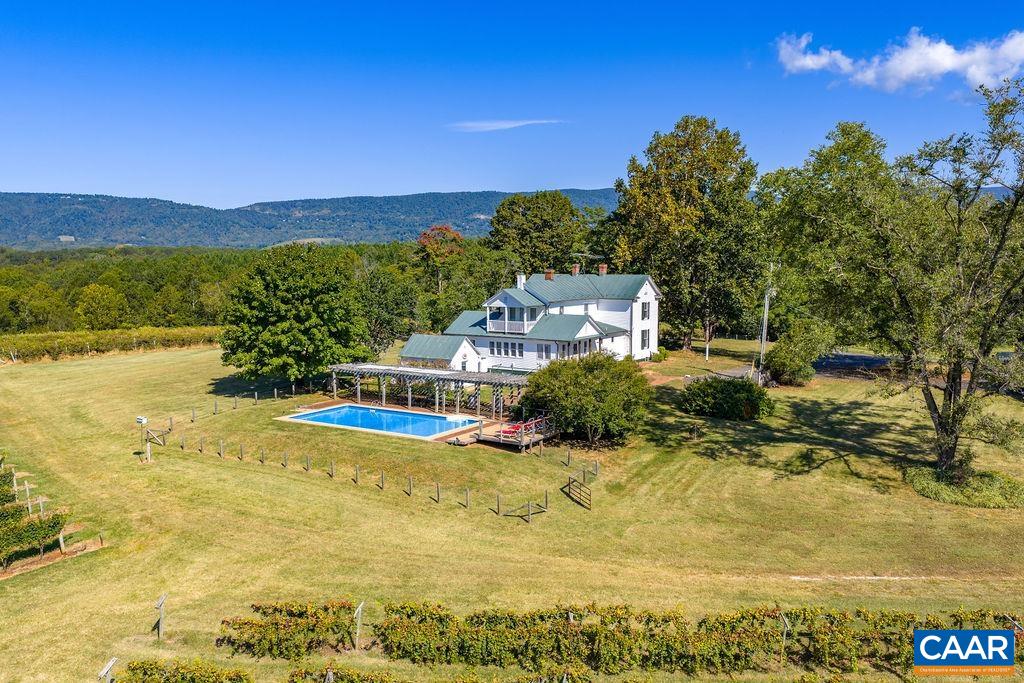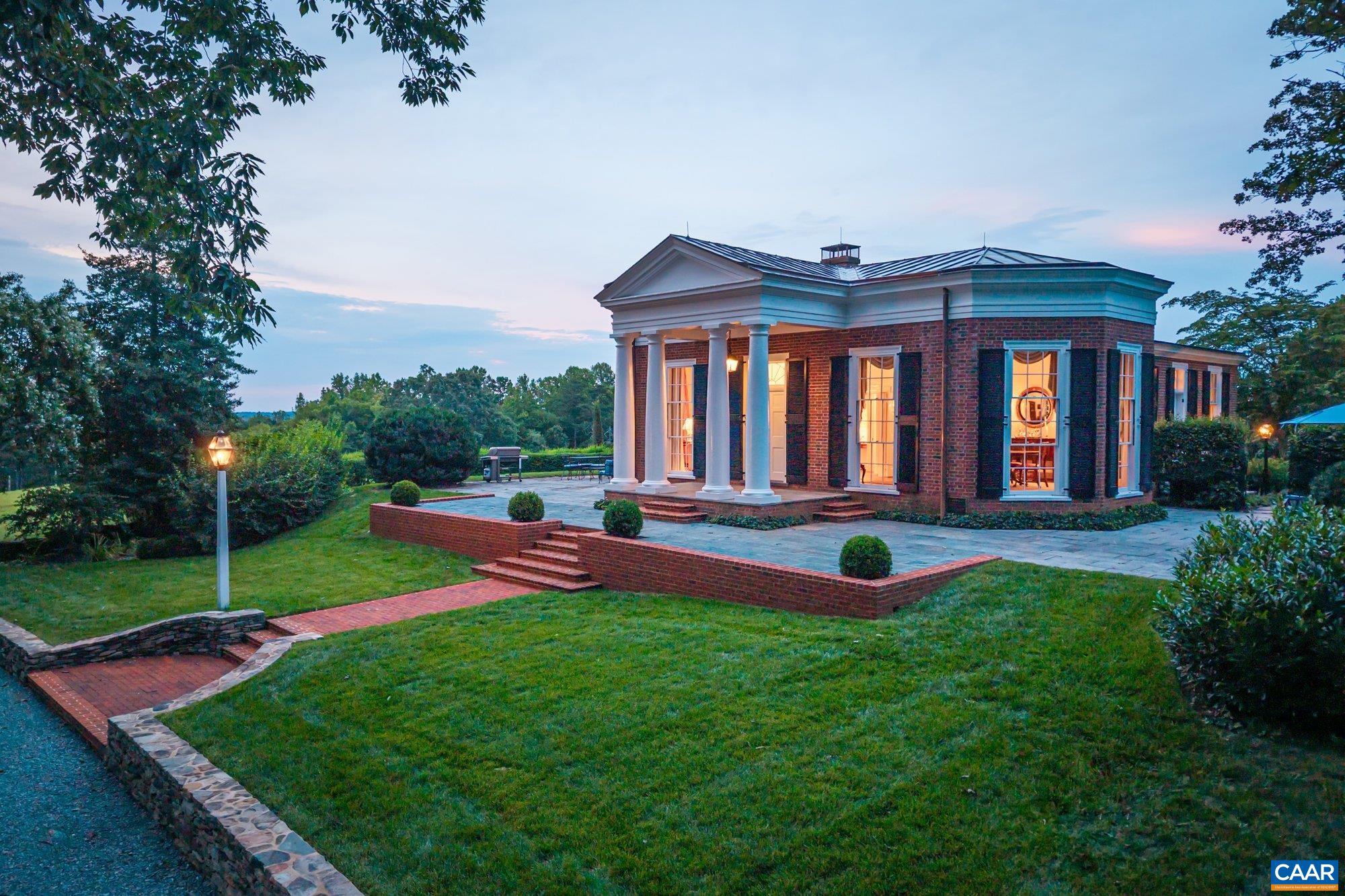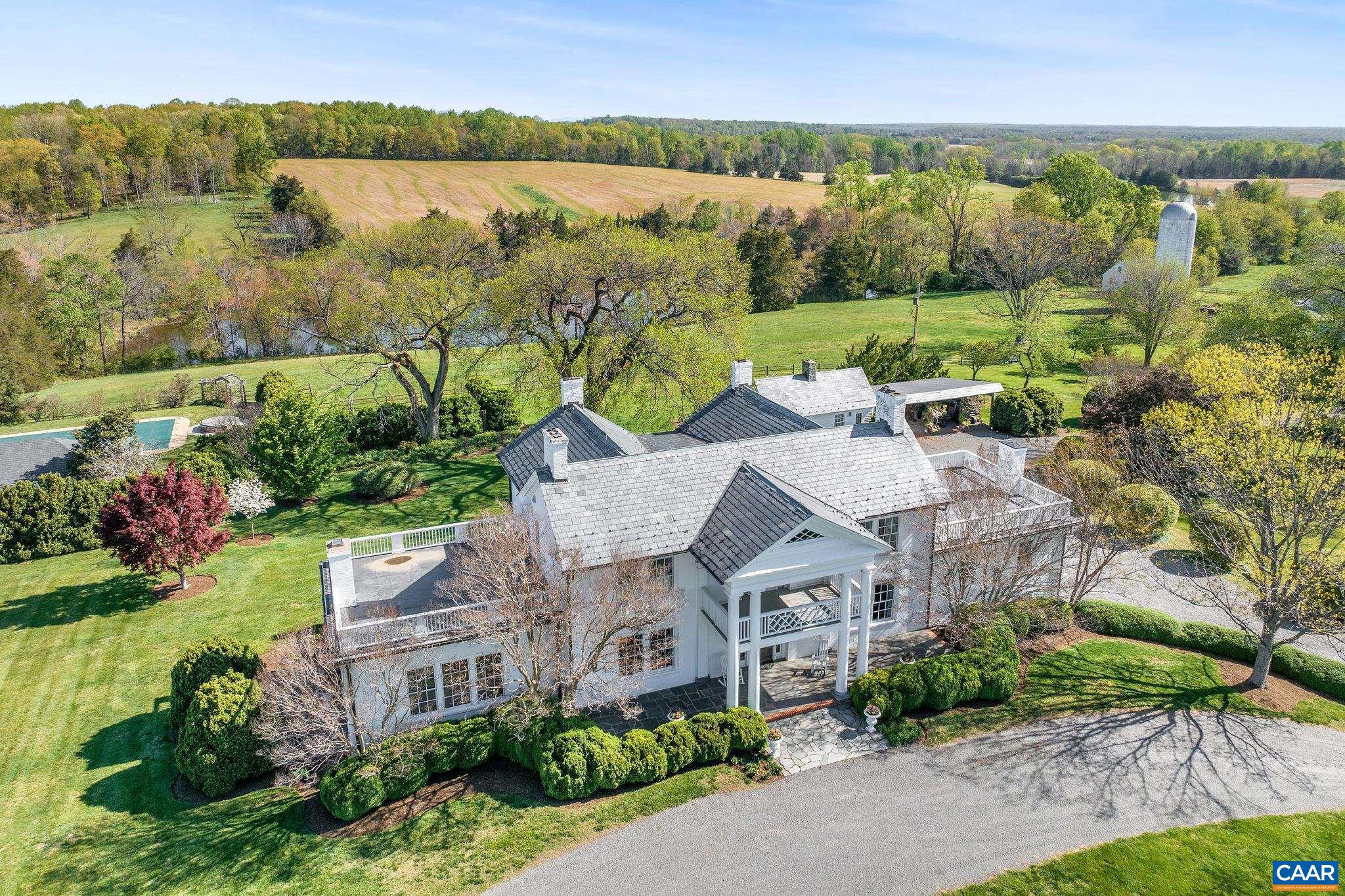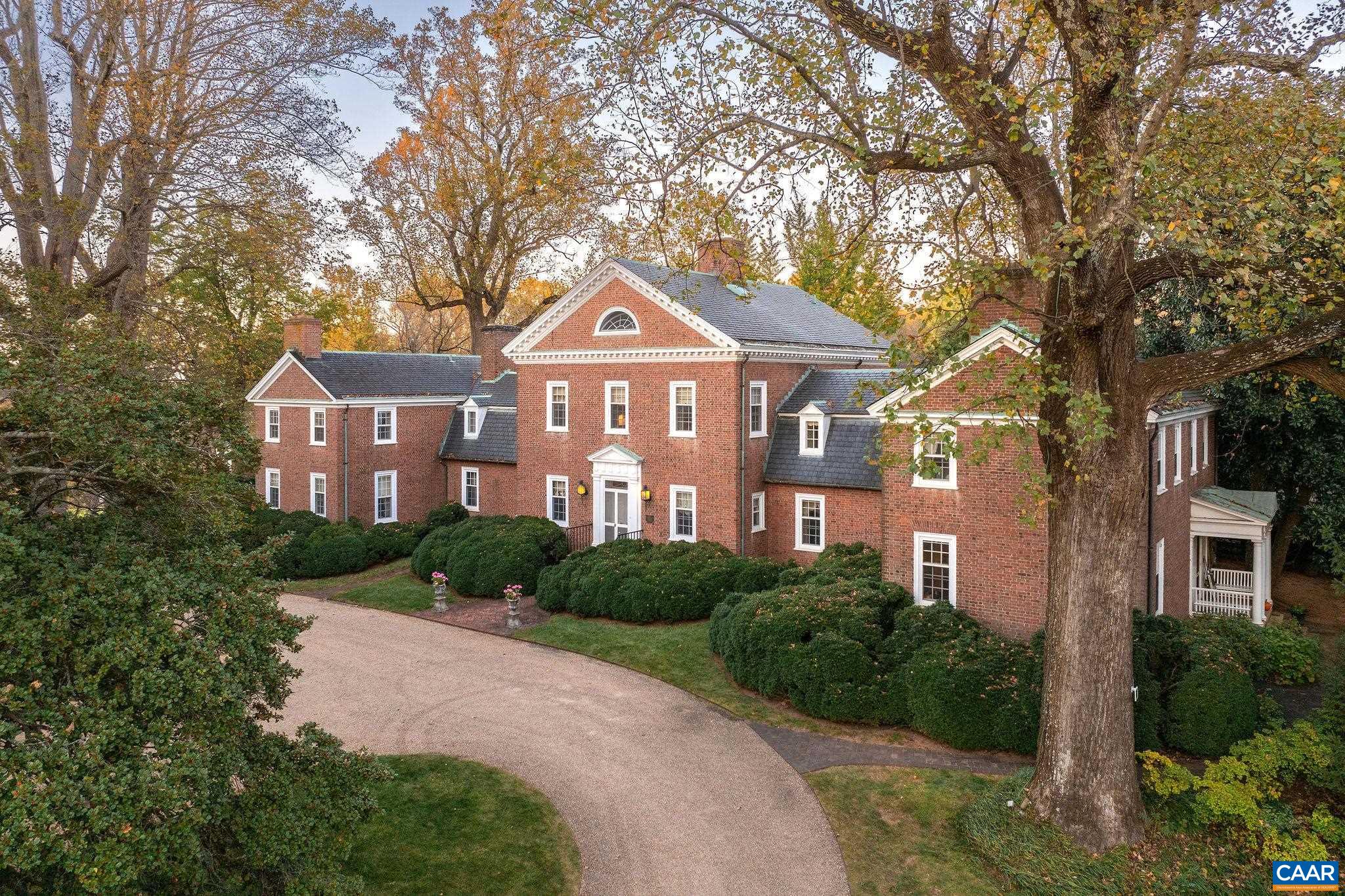Charlottesville Historic Homes For Sale
 $1,450,000
Active
$1,450,000
Active
294 & 262 Freshwater Cove Ln Lovingston, Virginia
5 Beds 6 Baths 4,061 SqFt 35.07 Acres
 $1,495,000
Active
$1,495,000
Active
3276 Buckingham Springs Rd Dillwyn, Virginia
6 Beds 4 Baths 4,592 SqFt 90.01 Acres
 $1,795,000
Active
$1,795,000
Active
409 Park St Charlottesville, Virginia
5 Beds 5 Baths 8,884 SqFt 0.17 Acres
 $1,798,000
Active
$1,798,000
Active
801 East Jefferson St Charlottesville, Virginia
5 Beds 4 Baths 4,520 SqFt 0.06 Acres
 $1,900,000
Active
$1,900,000
Active
1843 Cabell Rd Wingina, Virginia
7 Beds 5 Baths 8,008 SqFt 43.02 Acres
 $1,995,000
Active
$1,995,000
Active
590 N Madison Road Orange, Virginia
3 Beds 3 Baths 3,070 SqFt 9.7 Acres
 $2,195,000
Active
$2,195,000
Active
290 Riley Hollow Rd Huntly, Virginia
3 Beds 3 Baths 2,236 SqFt 116.8 Acres
 $2,500,000
Active
$2,500,000
Active
1004 Beverley St E Staunton, Virginia
6 Beds 6 Baths 9,315 SqFt 15.92 Acres
 $2,600,000
Active
$2,600,000
Active
23350 Cedar Mountain Dr Rapidan, Virginia
4 Beds 4 Baths 3,184 SqFt 111.09 Acres
 $2,600,000
Active
$2,600,000
Active
6908 Roxbury Mill Rd S Spotsylvania, Virginia
4 Beds 6 Baths 4,775 SqFt 3.69 Acres
 $3,275,000
Active
$3,275,000
Active
4710 Dickerson Rd Charlottesville, Virginia
4 Beds 3 Baths 6,808 SqFt 100.12 Acres
 $3,500,000
Active
$3,500,000
Active
9175 Batesville Rd Afton, Virginia
5 Beds 3 Baths 7,931 SqFt 81.37 Acres
 $3,750,000
Active
$3,750,000
Active
400 Doe Ln Chatham, Virginia
5 Beds 2 Baths 5,500 SqFt 619 Acres
 $5,425,000
Active
$5,425,000
Active
1787 Light Horse Ln Delaplane, Virginia
4 Beds 5 Baths 5,954 SqFt 55.8 Acres
 $5,575,000
Active
$5,575,000
Active
575 Arcadian Way Orange, Virginia
5 Beds 5 Baths 13,455 SqFt 453 Acres
 $5,750,000
Active
$5,750,000
Active
1790 Lambs Rd Charlottesville, Virginia
4 Beds 4 Baths 4,552 SqFt 102.75 Acres
 $5,950,000
Active Under Contract
$5,950,000
Active Under Contract
3050 Rectortown Rd Marshall, Virginia
7 Beds 9 Baths 9,457 SqFt 40.63 Acres
 $6,995,000
Active
$6,995,000
Active
23501 Greenville Rd Culpeper, Virginia
5 Beds 4 Baths 11,413 SqFt 716.52 Acres
 $7,175,000
Active
$7,175,000
Active
2328 Liberty Corner Rd Esmont, Virginia
4 Beds 4 Baths 10,816 SqFt 498 Acres
 $7,850,000
Active
$7,850,000
Active
19184 Mt Sharon Rd Orange, Virginia
8 Beds 9 Baths 10,200 SqFt 77.49 Acres
 $11,200,000
Active
$11,200,000
Active
1610 Delaplane Grade Rd Upperville, Virginia
4 Beds 4 Baths 11,410 SqFt 365.6 Acres
 $18,500,000
Active
$18,500,000
Active
8199 Scottland Farm Dr Esmont, Virginia
4 Beds 4 Baths 10,816 SqFt 1,888 Acres
Toby Beavers, a Charlottesville historic homes specialist, may be reached by phone or text at 434-327-2999

Discovering Timeless Elegance of Our Charlottesville Historic Homes for Sale
As a dedicated Charlottesville historic home realtor with 22 years of experience in this remarkable market, I’ve had the privilege of helping countless families find their perfect piece of Virginia history. Please note, many of these Virginia historic homes for sale are located outside of the Charlottesville area but within 1 hour.
My name is Toby Beavers, and throughout my career since 2003, I’ve specialized in Charlottesville historic homes, guiding buyers through the unique journey of purchasing these architectural treasures that tell the story of our region’s rich past.
The allure of Charlottesville historic homes for sale extends far beyond their stunning facades and period details. These properties represent a connection to America’s founding era, where every room whispers stories of generations past, and every architectural element reflects the craftsmanship of bygone eras. In my two decades of experience in Charlottesville historic real estate, I’ve witnessed firsthand how these homes continue to captivate buyers seeking not just a residence, but a legacy.
The Enduring Appeal of Charlottesville Historic Architecture in Jefferson’s Country
Charlottesville and the surrounding Albemarle County region, often referred to as “Jefferson’s Country,” boasts one of the most impressive collections of historic homes in Virginia. The historic homes near Charlottesville VA showcase a remarkable variety of architectural styles that span nearly three centuries of American building traditions. From the elegant Federal-style mansions of the early 1800s to the grand Colonial Revival estates of the early 20th century, each property tells a unique story of American architectural evolution.
The architectural landscape of historic homes Charlottesville VA is dominated by several distinctive styles that reflect the area’s rich cultural heritage. Federal-style homes, with their symmetrical facades, elegant proportions, and refined decorative elements, represent the sophisticated taste of the early American republic. These homes typically feature low-pitched roofs, Palladian windows, and are constructed of brick or stone, embodying the classical ideals that Thomas Jefferson himself championed.
Georgian architecture also plays a prominent role in the local historic home market, characterized by rectangular designs, symmetrical layouts, steeply pitched roofs, and central chimneys. These homes often feature beautiful wood siding, double-hung windows, and central hall layouts that were the height of fashion in colonial America. The influence of Thomas Jefferson’s neoclassical preferences can be seen throughout many of these properties, with their emphasis on proportion, symmetry, and classical detailing.
Understanding the Historic Home Market in Albemarle County
The market for historic homes Albemarle County VA has shown remarkable resilience and appreciation over the past several years. Unlike newer construction that may depreciate or lose appeal over time, historic homes often appreciate faster than contemporary homes in the same area. In fact, research suggests that historic properties can be valued as much as 26% higher than other homes in the same neighborhood, making them not just beautiful residences but sound financial investments.
The current Charlottesville real estate market presents unique opportunities for historic home buyers. Recent market data indicates that while overall home sales in 2024 finished about 5% lower than in 2023, this was largely due to limited inventory rather than decreased demand. The median home value in Charlottesville has been rising year over year, with the average sale price increasing from $719,191 in Q1 2024 to $779,573 in Q1 2025—an impressive 8.4% increase.
This appreciation trend is particularly pronounced in the historic home segment, where the combination of architectural significance, limited supply, and growing appreciation for heritage properties creates a competitive market environment. Historic homes tend to be less affected by market downturns, providing stability and long-term value appreciation that makes them attractive to both owner-occupants and investors.
Architectural Styles That Define Charlottesville’s Historic Character
Colonial and Georgian Elegance
The Colonial homes in our region represent some of the finest examples of early American residential architecture. These properties typically feature symmetrical, rectangular designs with steeply pitched roofs and central chimneys. The exterior materials often include traditional wood siding or brick construction, with double-hung windows arranged in perfect symmetry around a centrally located front door. Inside, you’ll find the characteristic central hall layout that was both practical and elegant, allowing for good cross-ventilation while maintaining formal entertaining spaces.
Federal Style Sophistication
Federal-style homes, prevalent throughout Charlottesville historic real estate, emerged in the late 18th and early 19th centuries as America developed its own architectural identity. These homes showcase refined proportions and elegant details, including elliptical fanlights over front doors, delicate window moldings, and sophisticated interior millwork. The Federal style represents the height of early American craftsmanship, with hand-carved woodwork, elaborate mantels, and graceful staircases that remain stunning examples of period artistry.
Greek Revival Grandeur
The Greek Revival movement brought classical temple forms to residential architecture, creating some of the most imposing and elegant homes in the Charlottesville area. These properties feature prominent columns, triangular pediments, and bold horizontal lines that convey dignity and permanence. Many Greek Revival homes in our area were built during the antebellum period and represent the economic prosperity and cultural sophistication of their original owners.
Victorian Charm and Colonial Revival Refinement
The Victorian era brought elaborate decorative elements and varied rooflines to local architecture, while the Colonial Revival movement of the early 20th century reinterpreted earlier American styles with modern conveniences. These Colonial Revival homes often feature the best of both worlds: the gracious proportions and traditional details of colonial architecture combined with updated plumbing, electrical systems, and modern amenities.
The Current 2025 Inventory: 35 Spectacular Properties
Through my website at tobybeaversrealtor.com, I currently showcase 35 spectacular Charlottesville historic homes for sale that represent the finest examples of our region’s architectural heritage. These Charlottesville historic homes for sale span a wide range of styles, price points, and settings, from intimate in-town residences to grand country estates.
Each of these Charlottesville historic homes for sale has been carefully selected for its architectural significance, historical importance, and exceptional condition. Many have been lovingly restored by previous owners who understood the importance of preserving original details while incorporating modern conveniences. Others present exciting opportunities for buyers who want to put their own stamp on a historic property while respecting its architectural integrity.
The diversity of these Charlottesville historic homes for sale reflects the rich architectural tapestry of our region. You’ll find everything from elegant Federal-style townhouses in Charlottesville’s historic districts to sprawling Colonial Revival estates on extensive acreage in Albemarle County. Each property tells its own story, whether it’s a modest farmhouse that has witnessed centuries of agricultural life or a grand mansion that once hosted political luminaries and cultural icons.
When browsing through these Charlottesville historic homes for sale, potential buyers often express amazement at the quality of craftsmanship and attention to detail that characterizes these properties. The collection of Charlottesville historic homes for sale I maintain represents years of careful curation, ensuring that each property meets the highest standards of architectural significance and structural integrity.
The Benefits of Owning a Charlottesville Historic Home
Financial Advantages
Investing in Charlottesville historic homes offers several financial benefits that extend beyond simple appreciation. Historic properties often qualify for various tax incentives and preservation grants that can help offset restoration costs. The Virginia Department of Historic Resources offers tax credits for qualifying rehabilitation projects, and the federal government provides similar incentives through the Historic Tax Credit program.
Furthermore, historic homes typically maintain their value better than newer construction during economic downturns. Their unique character, architectural significance, and limited supply create a market niche that tends to be more stable than the general real estate market. This stability, combined with their tendency to appreciate faster than comparable non-historic properties, makes them attractive long-term investments.
Cultural and Personal Rewards
Beyond the financial considerations, owning a historic home provides intangible benefits that money cannot quantify. These properties connect their owners to the broader sweep of American history, offering a tangible link to the past that enriches daily life. Many of my clients describe the profound satisfaction they derive from preserving and maintaining these architectural treasures for future generations.
The craftsmanship found in historic homes is simply unmatched by modern construction. Hand-carved millwork, original hardwood floors, solid masonry construction, and unique architectural details create living spaces that possess character and charm impossible to replicate in new construction. These elements contribute to a sense of permanence and authenticity that many homeowners find deeply satisfying.
Community and Lifestyle Benefits
Historic homes near Charlottesville VA often come with the additional benefit of being located in established neighborhoods with mature landscaping, walkable streets, and strong community ties. Many of these areas have active neighborhood associations and historic preservation groups that work to maintain the character and integrity of their communities.
The lifestyle that comes with historic home ownership often includes a closer connection to local history and culture. Many historic neighborhoods in Charlottesville are within walking distance of the University of Virginia, downtown cultural attractions, restaurants, and shopping. This walkability and urban connectivity provide a quality of life that suburban developments often cannot match.
Navigating the Historic Home Buying Process
Due Diligence and Inspection Considerations
Purchasing Charlottesville historic real estate requires a specialized approach that differs significantly from buying newer construction. As your historic home specialist, I work with a network of contractors, inspectors, and craftspeople who understand the unique challenges and opportunities presented by older properties.
The inspection process for historic homes must be thorough but sensitive to the property’s age and construction methods. We look for signs of structural issues, evaluate the condition of historic systems, and assess the quality of any previous restoration work. This process requires inspectors who understand traditional building techniques and can distinguish between cosmetic issues and serious structural concerns.
Foundation systems in historic homes may include stone, brick, or early concrete construction that requires specialized knowledge to evaluate properly. Electrical and plumbing systems often represent a combination of original installations and subsequent updates, requiring careful assessment to ensure safety and functionality while preserving historic character.
Understanding Preservation Guidelines
Many historic homes Albemarle County VA are subject to local historic district guidelines or are listed on the National Register of Historic Places. These designations provide certain benefits but also impose responsibilities on property owners regarding alterations and maintenance. As your realtor, I help clients understand these requirements and work with local preservation authorities to ensure compliance with applicable guidelines.
Historic district guidelines typically regulate exterior alterations visible from public streets, while interior changes are generally less restricted. Understanding these regulations before purchase is crucial for buyers who plan significant renovations or modifications. I maintain relationships with the local architectural review boards and preservation professionals who can provide guidance throughout the buying and renovation process.
Financing Historic Properties
Financing Charlottesville historic homes may involve specialized loan products or additional considerations not required for newer construction. Some lenders have specific experience with historic properties and understand the unique appraisal challenges these homes may present. I work with mortgage professionals who specialize in historic properties and can navigate the sometimes complex process of valuing and financing these unique assets.
Renovation loans may be necessary for buyers planning significant restoration work, and I can connect clients with lenders who offer construction-to-permanent financing options specifically designed for historic properties. These specialized loan products allow buyers to purchase and renovate historic homes with a single financing transaction.
Restoration and Preservation Considerations
Working with Qualified Professionals
Successful historic home ownership requires building relationships with contractors, architects, and craftspeople who specialize in preservation work. Over my 22 years in this market, I’ve developed an extensive network of professionals who understand traditional building techniques and have experience working with historic properties.
Finding qualified restoration professionals is crucial because historic homes require specialized knowledge and skills. Modern contractors may not understand traditional joinery techniques, historic mortar composition, or period-appropriate materials. The craftspeople in my network have demonstrated expertise in areas such as traditional plastering, historic window restoration, slate and wood shingle roofing, and period millwork reproduction.
Balancing Preservation with Modern Living
One of the most rewarding aspects of my work with historic homes Charlottesville VA is helping buyers understand how to balance preservation goals with modern lifestyle needs. Today’s historic homeowners want period authenticity but also expect contemporary conveniences such as modern kitchens, updated bathrooms, and efficient HVAC systems.
The key to successful historic home renovation lies in understanding which elements are architecturally significant and must be preserved, and which areas can accommodate modern updates without compromising the home’s historic character. Principal rooms with original mantels, millwork, and architectural details should be preserved and restored, while service areas such as kitchens and bathrooms often provide opportunities for sensitive modernization.
2025 Market Trends and Investment Potential
Current Market Dynamics
The market for Charlottesville historic real estate continues to show strong fundamentals despite broader economic uncertainties. The combination of limited supply, growing appreciation for heritage properties, and Charlottesville’s strong economic base creates favorable conditions for historic home investment.
Recent market analysis shows that historic properties in prime locations continue to appreciate at rates that exceed the general real estate market. This appreciation reflects both the intrinsic value of these properties and the growing recognition of their importance as cultural and architectural assets. The University of Virginia’s continued growth and the area’s attraction as a cultural and tourist destination support long-term demand for quality historic properties.
When examining current Charlottesville historic homes for sale, buyers often discover that these properties offer exceptional value compared to new construction of similar size and quality. The solid construction methods, quality materials, and unique architectural features found in Charlottesville historic homes for sale simply cannot be replicated at today’s construction costs.
Long-term Value Proposition
Historic homes represent more than just real estate investments; they are cultural assets that contribute to the character and identity of our community. This cultural significance, combined with their architectural merit and limited supply, creates a value proposition that extends beyond simple market dynamics.
The long-term outlook for historic homes near Charlottesville VA remains positive, supported by several key factors. The area’s continued economic growth, driven by the University of Virginia, healthcare, and technology sectors, provides a stable employment base that supports real estate values. Additionally, Charlottesville’s reputation as a desirable place to live, with its combination of cultural amenities, natural beauty, and historic character, attracts buyers from across the country.
The scarcity factor also plays a significant role in the value proposition of Charlottesville historic homes for sale. Unlike new construction, which can be built to meet demand, the supply of authentic historic homes is fixed and diminishing. This scarcity, combined with growing appreciation for heritage properties, supports long-term value appreciation for well-maintained historic homes.
Neighborhoods and Districts of Note
In-Town Historic Districts
Charlottesville’s historic districts offer some of the finest examples of Charlottesville historic homes in walkable neighborhoods with mature trees and established communities. The Preston Avenue and Fifeville areas contain numerous historic properties that reflect the city’s 19th and early 20th-century development patterns.
These in-town neighborhoods provide the convenience of urban living while maintaining the character and charm of their historic origins. Many properties in these areas are within walking distance of the University of Virginia, downtown restaurants and shops, and cultural attractions. The combination of location and architectural significance makes these properties particularly attractive to buyers seeking both convenience and character.
The availability of Charlottesville historic homes for sale in these prestigious districts varies throughout the year, with certain seasons traditionally offering more inventory than others. Spring and fall typically see increased activity in these neighborhoods, as sellers take advantage of favorable weather conditions to showcase their properties’ exterior features and landscaping.
Rural Historic Properties
The countryside surrounding Charlottesville offers some of the most spectacular historic homes Albemarle County VA, often set on extensive acreage with panoramic views of the Blue Ridge Mountains. These properties range from modest farmhouses to grand estates that rival the finest examples of American residential architecture.
Rural historic properties often provide opportunities for buyers seeking privacy, acreage, and connection to the land. Many of these properties include historic outbuildings such as barns, dependencies, and other structures that add to their charm and functionality. The combination of historic architecture and rural setting creates a lifestyle that appeals to buyers seeking refuge from urban pressures while maintaining reasonable access to city amenities.
Among the current Charlottesville historic homes for sale, several rural properties stand out for their exceptional settings and architectural significance. These estates often feature original dependencies, formal gardens, and agricultural buildings that provide insight into Virginia’s plantation-era lifestyle while offering modern buyers unique opportunities for country living.
Seasonal Considerations for Historic Home Buyers
Spring Market Activity
Spring traditionally represents the most active season for Charlottesville historic homes for sale, as sellers take advantage of blooming gardens and favorable weather to showcase their properties. During this season, buyers have the widest selection of Charlottesville historic homes for sale, though competition can be intense for the most desirable properties.
The spring market also allows buyers to fully assess the exterior condition and landscaping of historic properties. Mature gardens, original outbuildings, and architectural details are best appreciated during the growing season, making spring an ideal time for serious buyers to evaluate Charlottesville historic homes for sale.
Fall Opportunities
Fall can offer excellent opportunities for buyers of Charlottesville historic homes for sale, as motivated sellers may be more willing to negotiate on price and terms. The autumn season also showcases the mature landscaping that often accompanies historic properties, with established trees and shrubs providing a stunning backdrop for architectural photography and property tours.
Buyers considering Charlottesville historic homes for sale during the fall season should be prepared to move quickly, as inventory typically decreases during the winter months. Working with an experienced historic home specialist becomes particularly important during this season to identify and secure the best opportunities before they are withdrawn from the market.
My Approach as Your Historic Home Specialist
Comprehensive Market Knowledge
My 22 years of experience in Charlottesville historic real estate has given me intimate knowledge of the local market, including pricing trends, architectural styles, and the unique characteristics of different neighborhoods and properties. This experience allows me to provide clients with accurate market analysis and strategic advice throughout the buying or selling process.
I maintain detailed records of historic property sales, including information about architectural features, restoration costs, and market appreciation patterns. This database allows me to provide clients with comparative market analyses that account for the unique factors that affect historic property values.
My experience with Charlottesville historic homes for sale has taught me to recognize the subtle differences that can significantly impact a property’s value and desirability. From the quality of restoration work to the authenticity of architectural details, I help clients understand the factors that distinguish exceptional historic properties from merely old houses.
Professional Network and Resources
Success in the historic home market requires more than just real estate expertise; it demands a comprehensive understanding of preservation, restoration, and the regulatory environment that affects historic properties. I’ve built relationships with architects specializing in historic preservation, contractors experienced in traditional building techniques, and craftspeople skilled in period restoration work.
This network extends to professionals in related fields, including historic preservation consultants, specialty insurance agents, and lenders experienced with historic properties. Having access to these resources allows me to provide clients with comprehensive support throughout the purchase and ownership process.
When working with buyers interested in Charlottesville historic homes for sale, I can quickly connect them with the specialized professionals they may need for inspections, renovations, or ongoing maintenance. This network has been developed over decades of working exclusively with historic properties and represents one of the most valuable resources I offer to my clients.
Client Education and Support
Buying or selling Charlottesville historic homes requires specialized knowledge that many real estate professionals simply don’t possess. I pride myself on educating clients about the unique aspects of historic property ownership, including preservation responsibilities, available incentives, and the long-term benefits of investing in these architectural treasures.
This educational approach extends beyond the transaction itself. I provide ongoing support to clients after closing, connecting them with resources for maintenance, restoration, and preservation. Many of my clients become long-term partners in preserving our community’s architectural heritage, and I take pride in supporting their stewardship efforts.
For buyers new to historic homes, I often recommend starting with a property that requires minimal restoration work to gain experience with historic home ownership. The current inventory of Charlottesville historic homes for sale includes several turnkey properties that would be ideal for first-time historic home buyers.
Looking Forward: The Future of Historic Preservation
Growing Appreciation for Charlottesville Historic Properties
The market for historic homes Charlottesville VA benefits from growing national recognition of the importance of historic preservation. Younger buyers, in particular, are showing increased interest in properties with character and history, driven partly by environmental consciousness and partly by appreciation for authentic craftsmanship and materials.
This trend is supported by broader cultural movements toward sustainability and authenticity. Historic homes represent the ultimate in recycling and sustainable living, preserving embodied energy and materials while providing homes with character and charm that cannot be replicated in new construction.
The increasing popularity of historic properties among younger buyers has created new demand for Charlottesville historic homes for sale. These buyers often approach historic home ownership with fresh perspectives and innovative ideas for incorporating modern technology while respecting architectural integrity.
Technology and Preservation
Modern technology is making historic home ownership more practical and affordable than ever before. New HVAC systems can be designed to work efficiently in historic buildings without compromising architectural integrity. LED lighting provides energy efficiency while maintaining period-appropriate fixtures. Smart home technology can be integrated invisibly into historic properties, providing modern convenience without visual impact.
These technological advances are expanding the pool of potential buyers for historic homes Albemarle County VA by addressing some of the practical concerns that previously deterred modern families from considering older properties. The ability to maintain historic character while incorporating modern convenience and efficiency makes these homes increasingly attractive to contemporary buyers.
Buyers evaluating current Charlottesville historic homes for sale are often surprised to discover how successfully modern technology can be integrated into historic properties. From geothermal heating systems that operate invisibly to wireless networks that eliminate the need for extensive rewiring, technology is making historic home ownership more appealing than ever.
Specialized Services for Charlottesville Historic Home Buyers and Sellers
Marketing Historic Properties
Marketing Charlottesville historic homes for sale requires a specialized approach that showcases both the architectural significance and the lifestyle benefits of these unique properties. Unlike contemporary homes that may appeal primarily on the basis of size, location, or amenities, historic homes must be presented in a way that conveys their cultural importance and distinctive character.
My marketing approach for Charlottesville historic homes for sale emphasizes professional photography that captures architectural details, historical documentation that provides context and provenance, and comprehensive property descriptions that highlight both original features and modern updates. This specialized marketing approach ensures that historic properties reach the buyers most likely to appreciate their unique qualities.
Buyer Representation Services
Representing buyers in the purchase of Charlottesville historic homes for sale requires expertise that extends far beyond traditional real estate services. I help buyers understand the implications of various preservation restrictions, evaluate the quality of previous restoration work, and assess the potential for future improvements while maintaining architectural integrity.
My buyer representation services include detailed property research, architectural analysis, and coordination with specialized inspectors and contractors. I also provide guidance on available tax incentives, preservation grants, and financing options specifically designed for historic properties.
When working with buyers interested in Charlottesville historic homes for sale, I emphasize the importance of looking beyond surface appearances to understand the underlying structural and mechanical systems. Historic homes may present unique challenges and opportunities that require careful evaluation by knowledgeable professionals.
Contact Your Historic Home Specialist
As one of Charlottesville’s premier historic home specialists, I’m here to help you navigate the unique opportunities and challenges of this specialized market. Whether you’re searching for your first historic home or looking to sell a family property that has been in your family for generations, my experience and expertise can help you achieve your goals while preserving our community’s architectural heritage.
The current inventory of Charlottesville historic homes for sale includes some truly exceptional properties that represent the finest examples of American residential architecture. From elegant Federal-style townhouses to grand Colonial Revival estates, these homes offer the perfect combination of historical significance, architectural beauty, and modern livability.
I invite you to explore the 35 spectacular Charlottesville historic homes for sale currently available through my specialized historic homes program. Each property has been carefully selected for its architectural merit, historical importance, and exceptional condition. These Charlottesville historic homes for sale represent not just real estate opportunities, but chances to become part of Charlottesville’s ongoing story while preserving its architectural legacy for future generations.
Whether you’re drawn to the intimate scale of a Federal-style townhouse or the grandeur of a Colonial Revival estate, the current selection of Charlottesville historic homes for sale offers something for every taste and budget. These properties provide the rare opportunity to own a piece of American architectural history while enjoying the benefits of modern living in one of Virginia’s most desirable communities.
For more information about current Charlottesville historic real estate opportunities or to schedule a consultation about buying or selling historic properties, please contact me at 434-327-2999.
Together, we can find the perfect historic home that meets your needs while contributing to the preservation of our community’s irreplaceable architectural heritage.
The world of Charlottesville historic homes offers rewards that extend far beyond simple homeownership. These properties provide connection to our past, beauty in our daily lives, and the satisfaction of preserving America’s architectural legacy. As your guide through this specialized market, I’m committed to helping you discover the perfect historic home that will provide you with years of enjoyment while contributing to the ongoing story of this remarkable region.
Whether you’re a first-time buyer exploring Charlottesville historic homes for sale or an experienced collector of historic properties, I have the knowledge and resources to help you make informed decisions about these important investments. The current market offers exceptional opportunities for buyers who understand the unique value proposition of authentic historic properties in one of America’s most historically significant regions.
Toby Beavers has been specializing in Charlottesville historic homes for 22 years, helping families discover and preserve the architectural treasures of Virginia’s historic heartland.
Contact Toby by phone or text at 434-327-2999 to explore current historic home opportunities.

